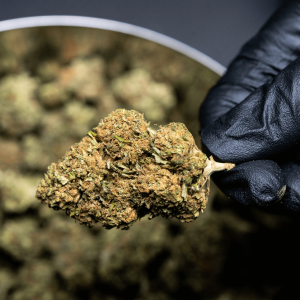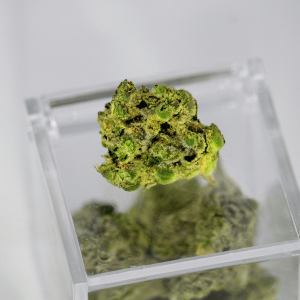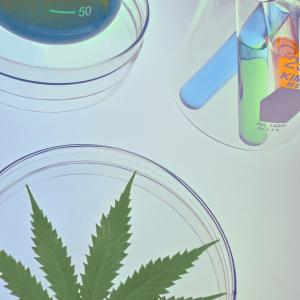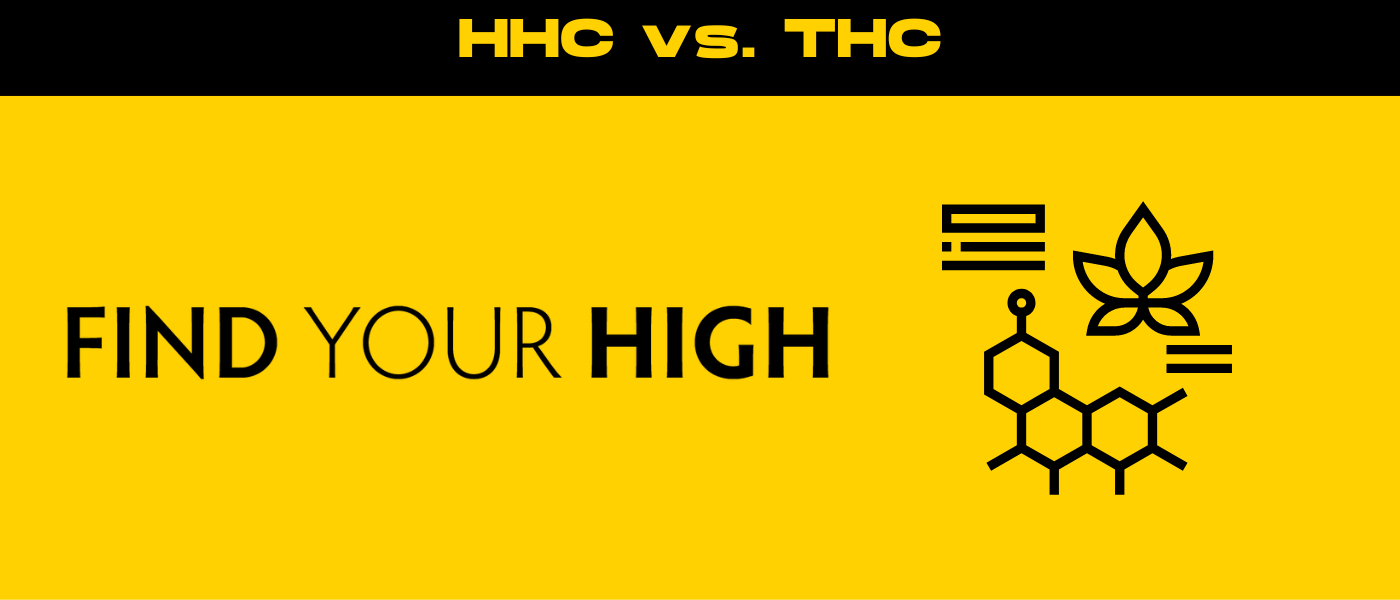It’s time to talk about everybody’s favorite topic: Cannabinoids — specifically, HHC vs. THC.
Now, don’t start sweating at the thought of this scientific stuff. This isn’t going to be like that high school chemistry class that made your brain feel overwhelmed. We promise.
Simply put, cannabinoids are compounds found in cannabis. They work hard to give you all of the effects commonly associated with the leafy green plant we all know and love.
Why are cannabinoids important, you ask? Well, they play a significant role in influencing how we experience cannabis. Some cannabinoids might make you feel like you could out-dance Beyoncé, while others might have you sinking into your couch like it’s a cloud.
All in all, knowing your cannabinoids can help you have the best possible experience with cannabis. Remember, knowledge is power, even when it comes to the green stuff! So, let’s dive deeper into this world of cannabinoids (specifically hhc and thc) together, shall we?
What is THC?
Tetrahydrocannabinol, commonly known as THC, is one of the primary cannabinoids found in cannabis. THC is responsible for the intense psychoactive effects often associated with cannabis, providing the feeling of euphoria or the “high” that users often describe. This unique characteristic sets THC apart from many other cannabinoids.
Origins and Extraction of THC
THC originates from the trichomes of the cannabis plant. Trichomes are tiny, hair-like structures on the plant surface that produce and store cannabinoids and other compounds.
The extraction of THC involves several stages. Initially, the cannabis plant is harvested and dried. After that, the dried plant material is processed to separate the trichomes rich in THC. The isolated trichomes (or kief) can be further refined through heat and pressure to create hash, or it can be extracted using various solvents like alcohol, butane, or carbon dioxide to yield a concentrated THC extract.
This extract, depending on its purity, is then used for various products including THC gummies, oils, other edibles, and tinctures.

Effects of THC
When discussing the effects of THC, it is crucial to mention both its psychological and physical impacts.
Psychological Impacts of THC
The effects of THC are like a wild ride. They can vary a lot from stoner to stoner.
For example, some stoners feel all warm and fuzzy inside, with a different take on time and space. THC can even boost creativity and make colors pop, sounds vibrate, and tastes explode on your tongue.
Nonetheless, it’s important to watch out for higher doses as smoking marijuana might bring a bit of anxiety, paranoia, or even hallucinations for some people. Stay cool and know your limits.
Physical Effects of THC
Physically, THC can bring about relaxation and ease physical discomfort, which is helpful in managing pain through medical cannabis use. It can also give you the munchies, making it potentially useful for patients going through treatments that mess with their appetite like chemo.
However, THC does come with some side effects like dry mouth, red eyes, and impaired motor skills. If you use it for a long time, it could lead to more serious health issues like respiratory problems when smoking and even dependency.
Just remember, while THC can have its therapeutic perks, it also comes with risks, especially if you go overboard or use it for too long. So, always use it responsibly and in moderation.
Medical Benefits of THC
Beyond its recreational application, THC also offers an array of potential medical benefits, specifically in the areas of pain management and mental health.
Pain Management Potential
THC has a major medical application in managing chronic pain. It’s beneficial for patients dealing with persistent discomfort from conditions like arthritis, fibromyalgia, endometriosis, and cancer or its treatment.
THC interacts with the body’s endocannabinoid system, reducing inflammation and blocking pain signals to the brain. This not only eases physical suffering but also enhances the quality of life for patients burdened with constant pain.
Mental Health Applications
When it comes to mental health, there’s evidence suggesting that THC and THCa could help ease symptoms linked to conditions like PTSD, depression, and anxiety. THC’s psychoactive effects can bring temporary euphoria and offer relief for those dealing with mood disorders, while THCa, a non-psychoactive cannabinoid, may contribute to mental well-being through its potential anti-inflammatory and neuroprotective properties.
THC may also positively impact the endocannabinoid system, helping to stabilize mood and promote a sense of calm. THCa, although non-psychoactive, might support mental health in a complementary way.
However, it’s important to remember that while THC and THCa might provide short-term relief for some, others could experience increased anxiety or paranoia. If you’re considering using THC or THCa for mental health reasons, it’s crucial to do so under the guidance and supervision of a healthcare professional.
The medical use of THC and THCa should be approached with caution, taking into account individual differences and potential risks. Always consult with a healthcare provider before exploring THC or THCa for medical purposes.
Side Effects and Risks of THC
Like any other substance, THC isn’t without its risks and potential side effects.
While THC can bring relief and even some enjoyment, using it heavily or for a long time can raise health concerns. Regular THC use, especially by smoking, can affect the lungs and cause respiratory issues. It can also lead to cognitive effects like memory and concentration problems, which are particularly worrisome for young users whose brains are still developing.
There’s also the risk of dependency and addiction. For some people, using THC regularly can result in Cannabis Use Disorder, a condition where they can’t stop using it despite its negative impacts on their life.

What is HHC?
Hexahydrocannabinol, or HHC for short, is another cannabinoid found in the cannabis plant. It may not be as well-known as THC, but HHC has some unique characteristics that are catching the attention of cannabis researchers.
Unlike THC, HHC isn’t naturally present in large amounts – instead, it’s usually made through a process called hydrogenation, where hydrogen is added to the THC molecule. Pretty cool, right?
Origins and Extraction of HHC
HHC isn’t naturally found in large amounts in the cannabis or hemp plant either. Though HHC occurs naturally in the plant, it’s made commercially through a chemical process called hydrogenation. Basically, THC gets mixed with hydrogen under specific conditions, and that hydrogen attaches to the THC molecule, turning it into a HHC molecule.
To extract HHC from the cannabis plant, a similar process to THC extraction is used. First, the plant is harvested and dried. Then, the dried material is processed to separate the trichomes, which have the cannabinoids. These trichomes can then go through the hydrogenation process to convert THC into HHC. From there, HHC products are made, including HHC gummies.
Since it’s quite a complex process, making HHC is usually done in a lab with controlled conditions. This way, they can produce HHC in larger quantities for different products like tinctures, edibles, and oils.
Effects of HHC
As we dive deeper into the world of other cannabinoids, we discover that each one brings its own set of effects and potential benefits. Hexahydrocannabinol (HHC), while not as famous as its cousin THC, shows some exciting properties that are just waiting to be explored.
Psychological Impacts of HHC
Similar to THC, HHC products can also have psychological effects, but they’re usually milder.
Some users have mentioned feeling calm and relaxed after using HHC, without the intense euphoria or possible paranoia linked to high THC levels.
It’s often described as a more “clear-headed” high, offering a comfortable and less intense option for those seeking the therapeutic benefits of cannabinoids without a heavy psychoactive impact.
Physical Effects of HHC
Physically, HHC products seem to have fewer side effects compared to THC. Users have reported a mellow body high, which might help with relaxation and relieving minor aches and pains.
There are some stories suggesting that HHC could also increase appetite, similar to THC. However, it’s important to remember that research on HHC is still in its early stages, and more studies are needed to fully understand its physical effects and potential therapeutic uses.
Like with all cannabinoids, use HHC responsibly and keep in mind that everyone’s body reacts differently to these compounds.
Medical Benefits of HHC
As research on Hexahydrocannabinol (HHC) keeps going, it’s becoming clear that this cannabinoid has some serious potential in the medical field.
Two really interesting areas are its ability to provide pain relief and protect our brains. This could be a game-changer when it comes to managing pain and keeping our brains healthy!
Analgesic Potential of HHC
Preliminary findings suggest that HHC might have pain-relieving properties, like being a natural painkiller. This could be a good alternative or addition to traditional pain meds, especially for people dealing with chronic pain.
Similar to THC, HHC interacts with the body’s endocannabinoid system, which is important for managing pain. The pain-relieving properties of HHC could help reduce discomfort without the usual “high” associated with THC. But, we still need more research to fully grasp how HHC works and any potential side effects.
Neuroprotective Properties of HHC
HHC is showing promise as a neuroprotectant too! That means it could potentially protect nerve cells from damage and help with conditions like Alzheimer’s, Parkinson’s, and multiple sclerosis.
It might even be beneficial for people with brain injuries or neurodegenerative conditions. It’s important to note that while early research looks good, we still need more studies to fully understand HHC’s neuroprotective capabilities.
Side Effects and Risks of HHC
Just like any other substance, Hexahydrocannabinol (HHC) has its potential side effects and risks. Since scientific research on HHC is still in its early stages, we are still learning about the full range of effects. Some users have mentioned dry mouth, fatigue, and slight changes in appetite.
Using HHC may have potential health risks, especially in the long run. Because there are still many unknowns about the long-term effects of HHC on the body due to limited studies, users need to approach it with caution and use it responsibly.

HHC vs THC: A Comparative Analysis
When it comes to the world of cannabinoids, THC and HHC stand out as two interesting compounds.
Both are derived from marijuana plants, but they differ in several respects, including their chemical composition, structure, and psychoactive effects.
Chemical Structure Comparison
Though both THC and HHC originate from the same plant, their chemical structures are slightly different. THC, or tetrahydrocannabinol, is a naturally occurring compound in the cannabis plant. Its signature feature is a ring structure in its molecule, which plays a significant role in its psychoactive properties.
On the other hand, HHC, or hexahydrocannabinol, is a hydrogenated derivative of THC. This means that hydrogen is added to the THC molecule in a process known as hydrogenation, converting it into HHC. This subtle alteration in its chemical structure results in different effects when consumed.
Comparison of Psychoactive Effects
The psychoactive effects of THC and HHC are where things start to get interesting. THC is famous for its powerful psychoactive effects, responsible for the “high” we all know and love. It can make you feel euphoric, heighten your senses, and mess with your perception of time. But, it’s not all rainbows and unicorns – it can also bring about anxiety, paranoia, or even dependency.
On the other hand, HHC offers a more chill psychoactive experience. Users often feel relaxed and calm without the intense euphoria or potential paranoia that comes with high levels of THC. It’s like a “clear-headed” high, which could be a more comfortable option for those after the therapeutic benefits of cannabinoids without the heavy psychoactive stuff.
To sum it up, THC and HHC are similar in some ways but different in others. They have their own chemical structures and produce unique effects.
More research is needed to fully understand the pros and cons of each compound, but their differences give cannabis users a variety of choices to suit their individual needs and preferences.

Conclusion
In the diverse world of cannabinoids, Hexahydrocannabinol (HHC) is making waves as a promising new player. Unlike Tetrahydrocannabinol (THC), HHC offers users a unique, “clear-headed” high while showing potential for pain relief and brain health. However, we still need more studies to fully understand its capabilities and possible side effects.
HHC has gained attention for its reputed ability to provide a relaxed, mellow high without the intense euphoria or potential paranoia associated with THC. It could be a great option for those seeking the therapeutic benefits of cannabinoids but prefer a less intense psychoactive experience.
The potential medical benefits of HHC, particularly in pain management and neuroprotection, are incredibly exciting. However, we should approach these possibilities with caution until comprehensive research supports these claims.
While the long-term effects of HHC are still uncertain, it’s important for users to be aware of the potential risks and side effects. Like with any substance, responsible usage is key.
As we continue to explore and understand the complexity of cannabinoids, it’s clear that HHC is carving out its own unique space among cannabinoid compounds. The future of this compound looks promising, and it will be fascinating to see how research unfolds in the coming years.
Frequently Asked Questions
Is HHC stronger than THC?
No, HHC is not necessarily stronger than THC. While it does interact with the body’s endocannabinoid system, similar to THC, its effects are often described as more mellow and clear-headed.
The “high” from HHC is typically less intense compared to the high from THC, making HHC a more comfortable option for those seeking the therapeutic benefits of cannabinoids without the potent psychoactive effects of THC.
Is HHC bad for you?
While there is no definitive answer due to limited scientific research, any substance, including HHC, can have potential health risks when misused or overconsumed. It’s important to use HHC responsibly and listen to your body’s response.
Why is HHC legal?
HHC is largely considered legal because it is derived from hemp, a plant that is federally legal in many regions, including the United States, under the 2018 Farm Bill. However, as regulations on cannabis products can vary by location and are frequently updated, it’s always recommended to check the specific laws in your area.
How long does it take for HHC to hit?
The onset time for HHC effects can vary depending on several factors, including the method of administration and individual metabolism. However, users typically report feeling the effects within 15 to 45 minutes after consumption.

 Rewards
Rewards




